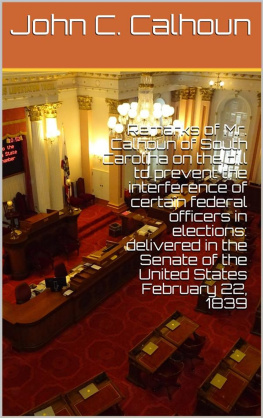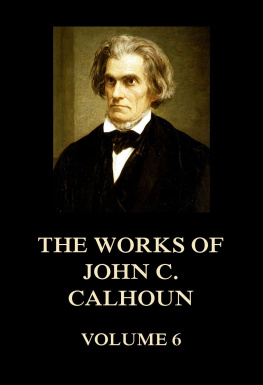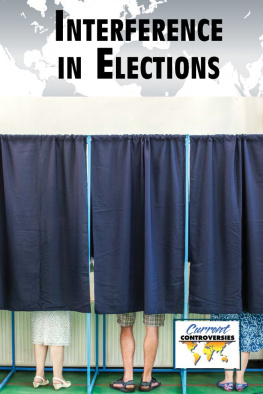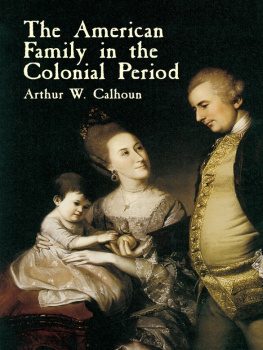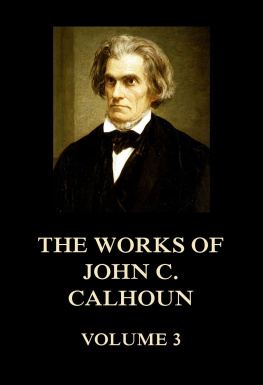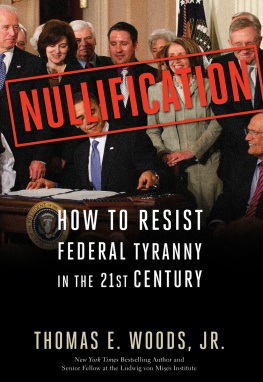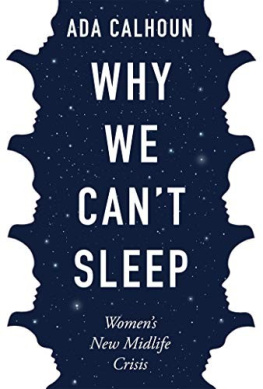John C. Calhoun,
"On Nullification and the Force Bill."
U.S. Senate,
15 February 1833
Mr. President:
At the last session of Congress, it was avowed on all sides that the public debt, as to all practical purposes, was in fact paid, the small surplus remaining being nearly covered by the money in the Treasury and the bonds for duties which had already accrued; but with the arrival of this event our last hope was doomed to be disappointed. After a long session of many months, and the most earnest effort on the part of South Carolina and the other Southern States to obtain relief, all that could be effected was a small reduction of such a character that, while it diminished the amount of burden, it distributed that burden more unequally than even the obnoxious Act of 1828; reversing the principle adopted by the Bill of 1816, of laying higher duties on the unprotected than the protected articles, by repealing almost entirely the duties laid upon the former, and imposing the burden almost entirely on the latter. It was thus that, instead of reliefinstead of an equal distribution of burdens and benefits of the government, on the payment of the debt, as had been fondly anticipatedthe duties were so arranged as to be, in fact, bounties on one side and taxation on the other; thus placing the two great sections of the country in direct conflict in reference to its fiscal action, and thereby letting in that flood of political corruption which threatens to sweep away our Constitution and our liberty.
This unequal and unjust arrangement was pronounced, both by the administration, through its proper organ, the Secretary of the Treasury, and by the opposition, to be a *permanent* adjustment; and it was thus that all hope of relief through the action of the general government terminated; and the crisis so long apprehended at length arrived, at which the State was compelled to choose between absolute acquiescence in a ruinous system of oppression, or a resort to her reserved powerspowers of which she alone was the rightful judge, and which only, in this momentous juncture, could save her. She determined on the latter.
The consent of two-thirds of her Legislature was necessary for the call of a convention, which was considered the only legitimate organ through which the people, in their sovereignty, could speak. After an arduous struggle the States-rights party succeeded; more than two-thirds of both branches of the Legislature favorable to a convention were elected; a convention was calledthe ordinance adopted. The convention was succeeded by a meeting of the Legislature, when the laws to carry the ordinance into execution were enactedall of which have been communicated by the President, have been referred to the Committee on the Judiciary, and this bill is the result of their labor.
Having now corrected some of the prominent misrepresentations as to the nature of this controversy, and given a rapid sketch of the movement of the State in reference to it, I will next proceed to notice some objections connected with the ordinance and the proceedings under it.
The first and most prominent of these is directed against what is called the test oath, which an effort has been made to render odious. So far from deserving the denunciation that has been levelled against it, I view this provision of the ordinance as but the natural result of the doctrines entertained by the State, and the position which she occupies. The people of Carolina believe that the Union is a union of States, and not of individuals; that it was formed by the States, and that the citizens of the several States were bound to it through the acts of their several States; that each State ratified the Constitution for itself, and that it was only by such ratification of a State that any obligation was imposed upon its citizens. Thus believing, it is the opinion of the people of Carolina that it belongs to the State which has imposed the obligation to declare, in the last resort, the extent of this obligation, as far as her citizens are concerned; and this upon the plain principles which exist in all analogous cases of compact between sovereign bodies. On this principle the people of the State, acting in their sovereign capacity in convention, precisely as they did in the adoption of their own and the Federal Constitution, have declared, by the ordinance, that the acts of Congress which imposed duties under the authority to lay imposts, were acts not for revenue, as intended by the Constitution, but for protection, and therefore null and void. The ordinance thus enacted by the people of the State themselves, acting as a sovereign community, is as obligatory on the citizens of the State as any portion of the Constitution. In prescribing, then, the oath to obey the ordinance, no more was done than to prescribe an oath to obey the Constitution. It is, in fact, but a particular oath of allegiance, and in every respect similar to that which is prescribed, under the Constitution of the United States, to be administered to all the officers of the State and Federal governments; and is no more deserving the harsh and bitter epithets which have been heaped upon it than that or any similar oath. It ought to be borne in mind that, according to the opinion which prevails in Carolina, the right of resistance to the unconstitutional acts of Congress belongs to the State, and not to her individual citizens; and that, though the latter may, in a mere question of *meum* and *tuum,* resist through the courts an unconstitutional encroachment upon their rights, yet the final stand against usurpation rests not with them, but with the State of which they are members; and such act of resistance by a State binds the conscience and allegiance of the citizen. But there appears to be a general misapprehension as to the extent to which the State has acted under this part of the ordinance. Instead of sweeping every officer by a general proscription of the minority, as has been represented in debate, as far as my knowledge extends, not a single individual has been removed. The State has, in fact, acted with the greatest tenderness, all circumstances considered, toward citizens who differed from the majority; and, in that spirit, has directed the oath to be administered only in the case of some official act directed to be performed in which obedience to the ordinance is involved.
It is next objected that the enforcing acts have legislated the United States out of South Carolina. I have already replied to this objection on another occasion, and will now but repeat what I then said: that they have been legislated out only to the extent that they had no right to enter. The Constitution has admitted the jurisdiction of the United States within the limits of the several States only so far as the delegated powers authorize; beyond that they are intruders, and may rightfully be expelled; and that they have been efficiently expelled by the legislation of the State through her civil process, as has been acknowledged on all sides in the debate, is only a confirmation of the truth of the doctrine for which the majority in Carolina have contended.
The very point at issue between the two parties there is, whether nullification is a peaceful and an efficient remedy against an unconstitutional act of the general government, and may be asserted, as such, through the State tribunals. Both parties agree that the acts against which it is directed are unconstitutional and oppressive. The controversy is only as to the means by which our citizens may be protected against the acknowledged encroachments on their rights. This being the point at issue between the parties, and the very object of the majority being an efficient protection of the citizens through the State tribunals, the measures adopted to enforce the ordinance, of course, received the most decisive character. We were not children, to act by halves. Yet for acting thus efficiently the State is denounced, and this bill reported, to overrule, by military force, the civil tribunal and civil process of the State! Sir, I consider this bill, and the arguments which have been urged on this floor in its support, as the most triumphant acknowledgment that nullification is peaceful and efficient, and so deeply intrenched in the principles of our system, that it cannot be assailed but by prostrating the Constitution, and substituting the supremacy of military force in lieu of the supremacy of the laws. In fact, the advocates of this bill refute their own argument. They tell us that the ordinance is unconstitutional; that it infracts the Constitution of South Carolina, although, to me, the objection appears absurd, as it was adopted by the very authority which adopted the Constitution itself. They also tell us that the Supreme Court is the appointed arbiter of all controversies between a State and the general government. Why, then, do they not leave this controversy to that tribunal? Why do they not confide to them the abrogation of the ordinance, and the laws made in pursuance of it, and the assertion of that supremacy which they claim for the laws of Congress? The State stands pledged to resist no process of the court. Why, then, confer on the President the extensive and unlimited powers provided in this bill? Why authorize him to use military force to arrest the civil process of the State? But one answer can be given: That, in a contest between the State and the general government, if the resistance be limited on both sides to the civil process, the State, by its inherent sovereignty, standing upon its reserved powers, will prove too powerful in such a controversy, and must triumph over the Federal government, sustained by its delegated and limited authority; and in this answer we have an acknowledgment of the truth of those great principles for which the State has so firmly and nobly contended.

